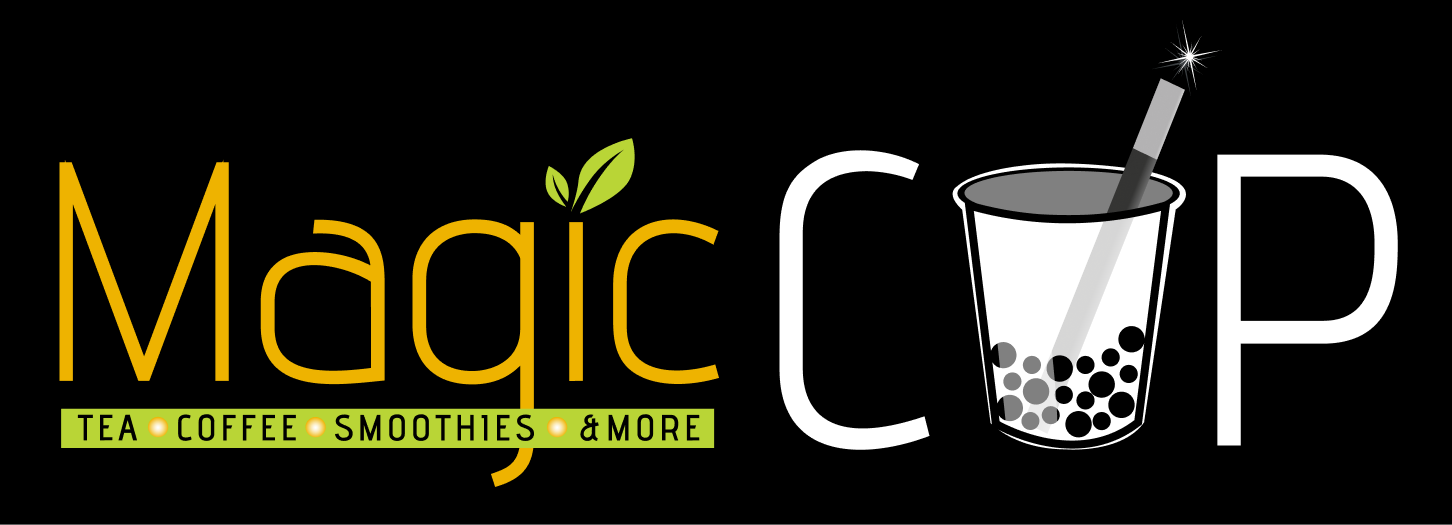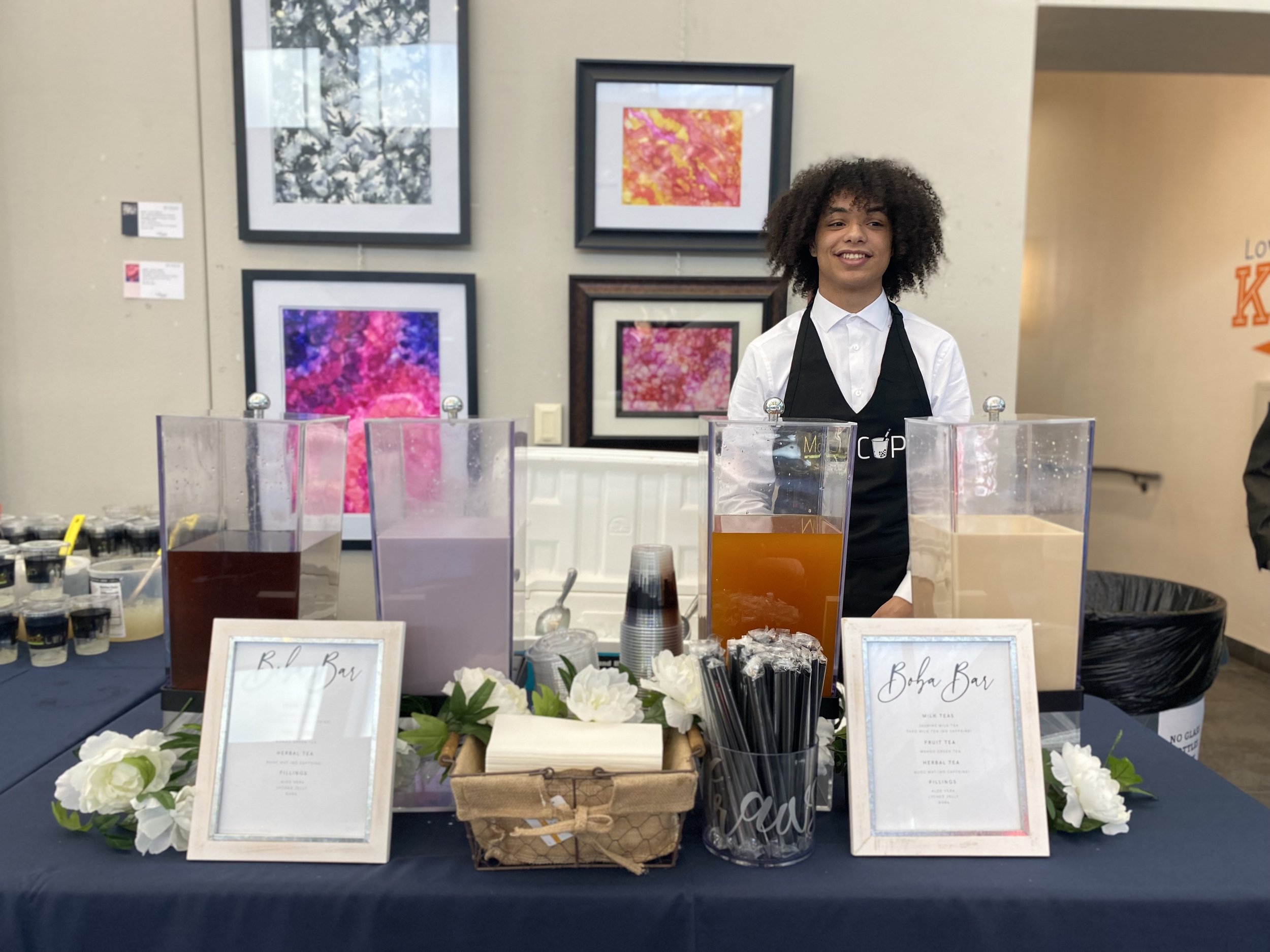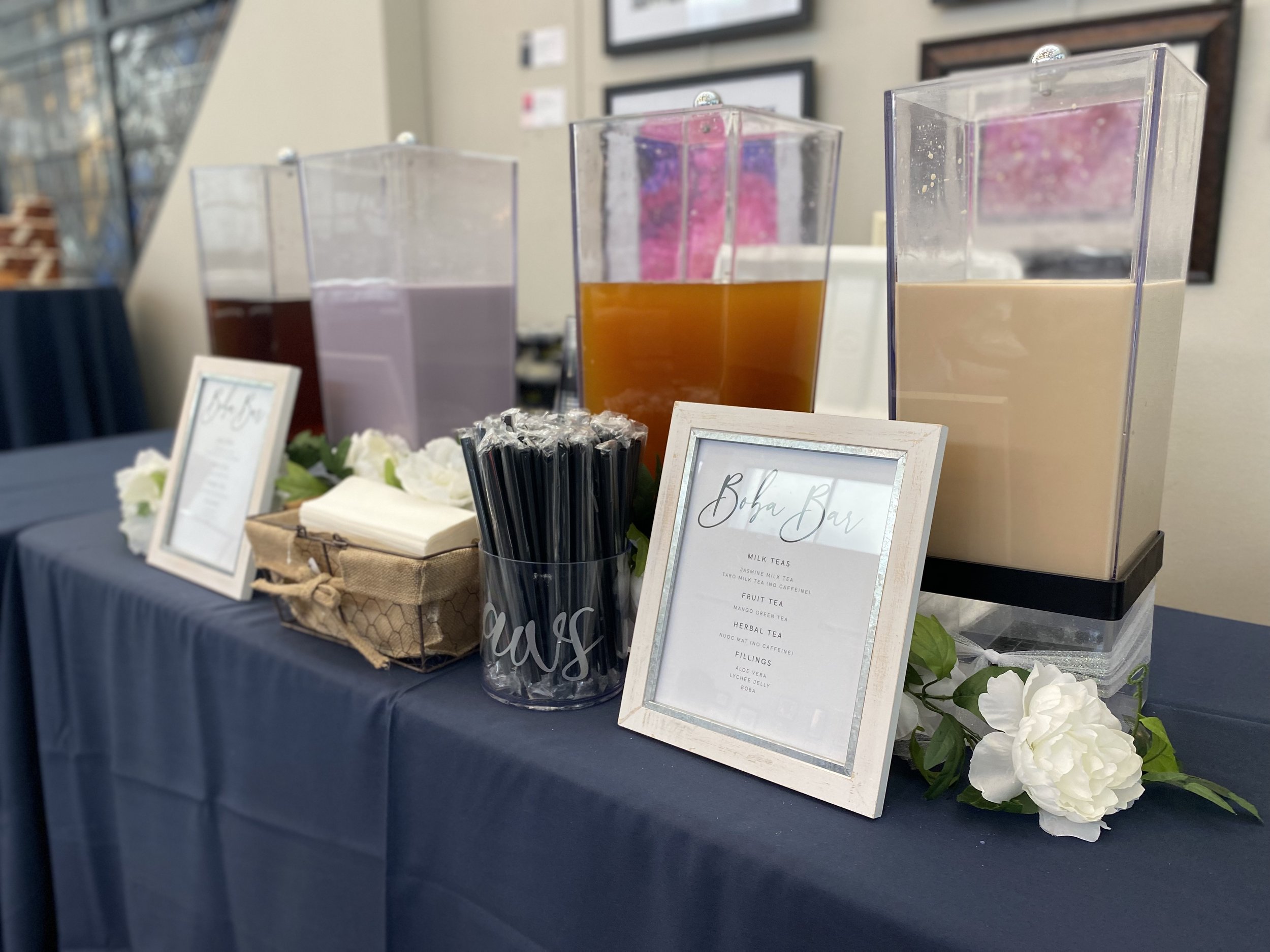Corporate Catering in Irving TX
Celebrate your big moments with all the things you love by your side — including bubble tea. With Magic Cup catering, you are able to sip on your favorite drinks whenever you please at any occasion! Planning an event can be stressful, but we are here to take some of the stress away with delicious, refreshing drinks that are sure to be a highlight from your event. We want you to have the event of your dreams, and if that means having milk tea and boba by your side then we’ve got you covered.
Make your special day that much better with Magic Cup drinks at the ready! Weddings, receptions, birthdays, family parties, and corporate events, we do it all. Just tell us a little bit about your event below. We offer complimentary tasting consultations for all catered events, allowing you to customize sweetness level and toppings to your party. If you have a large party or need on-site assistance, please notify us beforehand or make a note of it on our submission form. We kindly ask that larger parties give us a two week notice for catering services. If you have any questions, give us a call at any of our locations.
Planning Irving Corporate Catering: Strategies for Dietary Accommodations
In today’s diverse culinary landscape, catering services must be prepared to accommodate a wide range of dietary requirements. From allergies and intolerances to lifestyle choices and religious beliefs, the list of potential dietary restrictions is extensive. This can pose a considerable challenge when organizing an event or gathering, but with careful planning and effective strategies, these challenges can certainly be overcome.
Understanding Common Dietary Requirements with Irving Corporate Caterers
Your first step should be to familiarize yourself with the most common dietary restrictions. These include, but are not limited to:
Vegetarianism/veganism: No animal products or by-products.
Gluten-free: Avoidance of wheat and other gluten-containing grains.
Dairy-free/lactose intolerance: No dairy products.
Nut allergies: Avoidance of peanuts and tree nuts.
Religious diets: Halal, Kosher, Hindu vegetarian etc.
Understanding these diets will enable you to make informed decisions when it comes to menu planning.
Request Dietary Information from Guests Early On with an Irving Caterer
In order to cater effectively for your guests' dietary needs, it is essential that you collect this information as soon as possible. This could be done through RSVPs for smaller events or via surveys for larger gatherings. By receiving this information early on in the process, you will have ample time to plan your menu accordingly.
Create a Diverse Menu with a Catering Company in Irving
When planning your menu, aim for diversity. With so many different diets today, relying on a 'one-size-fits-all' approach may not work well. Instead:
Offer at least one vegetarian or vegan option.
Always have a gluten-free choice available.
Consider preparing some dishes that are free from common allergens.
When properly labeled and marketed, these inclusive offerings can actually enhance the appeal of your event.
Work with the Best Catering in Irving Professionals
For larger events where managing dietary requirements might seem overwhelming, consider hiring a professional catering company. A good caterer will have experience in dealing with dietary restrictions and can assist in creating a menu that caters to all guests.
When choosing a caterer: - Ask about their experience in dealing with dietary restrictions.- Check if they can provide clearly labeled dishes to avoid confusion. - Make sure they can deliver the quantity and quality you need for your event.
By implementing these strategies and giving careful consideration to the diverse dietary requirements of your guests, you can ensure a successful event that leaves everyone satisfied.
Key Considerations for Catering to Common Dietary Restrictions
In today's world, the diversity in dietary needs and preferences has grown significantly. This diversity presents a unique challenge when planning for catering services at events. However, it also provides an opportunity to demonstrate inclusivity and thoughtfulness in meal planning. Here are some key considerations when accommodating common dietary restrictions in catering.
Understand the Different Types of Dietary Restrictions
Understanding the different types of dietary restrictions is the first step towards successful event planning. These can be broadly categorized into:
Allergies and Intolerances: These include common allergies like nuts, dairy, gluten, shellfish etc., which can cause adverse reactions ranging from mild discomfort to life-threatening situations.
Dietary Preferences: Includes vegetarianism, veganism, or preference for organic foods.
Religious Restrictions: Certain religions have specific dietary rules, like kosher for Jews or halal for Muslims.
Health-related Restrictions: Some guests might be on low-sugar, low-sodium or other diet due to health reasons.
Be Clear About Guest Dietary Needs in Advance
To accommodate everyone's needs, you need to gather information about these dietary restrictions well before the event. This can be done through RSVPs or dedicated forms where guests can specify their needs.
Offer a Diverse Menu
A well-planned menu should offer diversity while meeting most of the common dietary restrictions:
Include a mix of vegetarian and non-vegetarian dishes.
Have at least one option each that is gluten-free and dairy-free.
Include dishes that are low in sugar and sodium.
Label Food Clearly
During the event, ensure that all dishes are clearly labelled with ingredients used. This not only helps guests choose according to their needs but also builds trust.
Work with Experienced Caterers
Work with caterers who have experience in handling diverse dietary requirements. They will have tried-and-tested recipes and strategies that can accommodate the various needs without compromising on taste.
Plan for Extra
Plan for extra servings of dishes accommodating dietary restrictions. Often, these dishes are preferred not just by those with restrictions but by other guests as well.
By taking into consideration the above points, catering to common dietary restrictions can be a less daunting task. Remember, the ultimate goal is to ensure that all guests feel included and can enjoy the event without worrying about their food needs.
The Importance of Gathering Dietary Information from Guests for Successful Catering
Understanding your guests' dietary needs and restrictions is pivotal to the success of any catering event. Whether you're planning a corporate function, a wedding, or a private dinner party, gathering dietary information from your guests ensures everyone can enjoy the meal and feel included.
Let's discuss why obtaining this information is crucial, and how to collect it effectively.
Why Collect Dietary Information
Creates an Inclusive Environment: Taking into account everyone's dietary requirement contributes to creating an inclusive atmosphere where all guests feel considered and valued.
Prevents Health Risks: Some guests may have serious allergies or intolerances. Knowing their needs allows you to prevent potential health risks.
Improved Experience: Offering meals that cater to your guests' specific dietary needs can significantly enhance their dining experience.
How To Gather Dietary Information
Collecting dietary requirements may seem like a daunting task, but here are some strategies that can make it easier:
Invitation RSVPs: When sending out invitations for the event, include an RSVP card that provides space for guests to indicate any food allergies or special dietary needs they may have.
Online Surveys: If you’re using digital invitations, consider incorporating an online survey tool such as Google Forms or SurveyMonkey to gather this information.
Direct Communication: For small events, it might be feasible to reach out directly to each guest and ask about their dietary restrictions.
Categorizing Dietary Preferences
Once gathered, categorizing these preferences will help your caterer prepare appropriate dishes for each diet type:
Food Allergies (e.g., nuts, dairy, seafood)
Religious Restrictions (e.g., Halal, Kosher)
Lifestyle Choices (e.g., Vegetarianism, Veganism)
Medical Conditions (e.g., Gluten intolerance, Diabetes)
Communicating Dietary Needs to Your Caterer
After collecting and sorting out the dietary information, the next critical step is communicating these details to your catering service provider. Be sure to:
Share the dietary information with your caterer as early as possible.
Discuss potential alternatives or adaptations for guests with special dietary needs.
Ensure that the caterer has experience in handling various dietary requirements and that they can deliver a diverse menu.
Remember, gathering dietary information from guests is not just about meeting their individual needs; it's also about demonstrating thoughtfulness and care for their well-being. By prioritizing this aspect in your event planning process, you pave the way for a successful and enjoyable event for everyone involved.
How to Plan Your Event Menu with a Focus on Diverse Dietary Needs
Hosting an event is an exciting but challenging task, and one of the primary concerns is the menu. In today's diverse world, it's crucial to anticipate and accommodate various dietary needs. To help you plan an inclusive menu for your next event, here are several steps and strategies:
Understand the Different Dietary Restrictions
Awareness is the first step towards catering to diverse dietary needs. Here are common restrictions you might encounter:
Vegetarianism/Veganism: Individuals following these diets avoid meat products. Vegans also exclude dairy products and any other animal-derived ingredients.
Gluten-Free: This diet excludes gluten, a protein found in grains like wheat, barley, and rye.
Dairy-Free: This diet avoids milk-based products which can trigger allergies or lactose intolerance.
Nut Allergies: Some people have severe allergic reactions to different types of nuts.
Survey Your Guests
Before finalizing your menu, make it a point to ask your guests about their dietary preferences or restrictions. This information will assist you in preparing a well-rounded menu that caters to everyone's needs.
Plan a Balanced Menu
Once you're aware of your guests' dietary requirements, plan a balanced menu featuring dishes that cater to these needs without sacrificing taste or creativity. For example:
Include vegetarian and vegan options: These could be salads, vegetable-based main dishes, or even vegan desserts.
If some guests are gluten intolerant: Consider offering gluten-free bread and pasta options.
For those who are lactose intolerant: Dairy-free variations of dishes can be incorporated.
Remember, variety is key; try not to repeat ingredients across different courses.
Collaborate with Catering Professionals
For large-scale events or if you're unsure about managing diverse dietary needs by yourself, consider working with professional caterers. They have experience in creating menus catering to various dietary preferences and restrictions, ensuring everyone at your event is catered to.
Label Your Food
Once the day of the event arrives, make sure all dishes are correctly labeled, indicating whether they are vegetarian, vegan, gluten-free, etc. This practice will ease your guests' minds and prevent any dietary mishaps.
In planning your event menu with a focus on diverse dietary needs, applying these strategies will ensure that all guests feel considered and enjoy a memorable meal. Remember that respecting and accommodating people's dietary restrictions contributes significantly to the success of any event.
Selecting the Best Professional Catering Company for Your Event Needs
Choosing the right catering company for your event is one of the most critical decisions you'll make in the planning process. Whether it's a corporate event, a wedding, or a birthday party, the quality of food and service can significantly impact your guests' overall experience. It is necessary to consider several factors before settling on the ideal caterer.
Understanding Your Requirements with the Best Caterers in Irving
Before you begin your search, it's vital to define your needs clearly. Here are some points to consider:
Event Type: The style and size of your event will greatly influence which caterer is most suitable. For example, a formal corporate event might require a different service than an informal outdoor gathering.
Budget: Knowing how much money you have to spend on catering can help narrow down your options.
Dietary Restrictions: If your guests have specific dietary needs (e.g., vegan, gluten-free), ensure that your chosen company can accommodate these requirements.
Research and Reviews of Catering Restaurants in Irving
Once you've got a clear idea of what you're looking for, start researching local companies:
Consider their specialties and whether they align with what you are looking for.
Searching online reviews can provide valuable insight into previous customers' experiences.
Ask Relevant Questions When Choosing a Restaurant Catering Service in Irving
After narrowing down potential candidates, contact each catering company to ask key questions:
Can they handle the size and scope of your event?
Will they be able to accommodate all dietary requirements communicated?
Are they available on the date required?
Request Tasting Sessions from Breakfast Catering in Irving
Tasting sessions are an excellent opportunity not only to sample cuisine but also to gauge presentation and portion sizes. This step allows you to determine firsthand if their food meets your taste and quality expectations.
Check References
Speak with previous clients about their experience with the caterer. Ask about punctuality, professionalism, food quality, presentation, and if they were able to uphold the dietary conditions specified.
Finalize Details
Once you've made your choice, work with the catering company to finalize all details, including:
Menu options and customization
Staffing and service needs
Setup and cleanup expectations
Final costs and payment terms
By considering these factors, you'll be better equipped to select a professional catering company that meets your event's unique needs. The right caterer will not only provide excellent food and service but also work with you to ensure that all dietary needs are met, contributing to a successful event.



